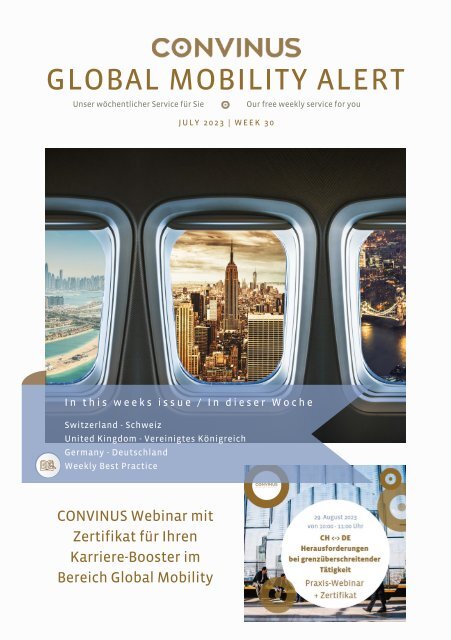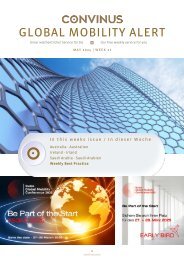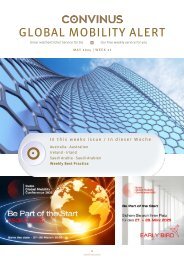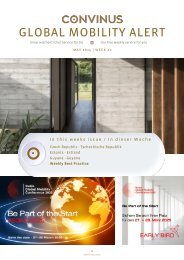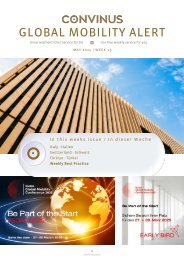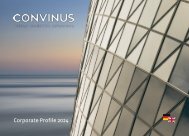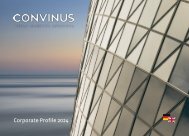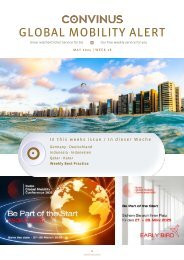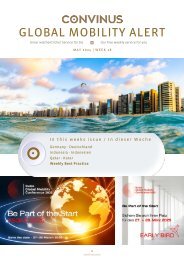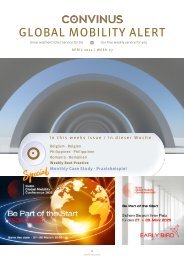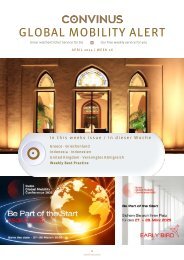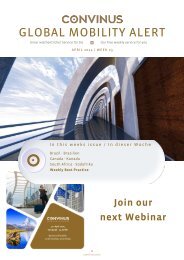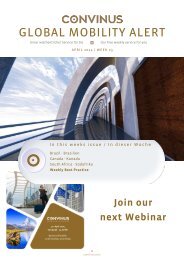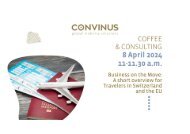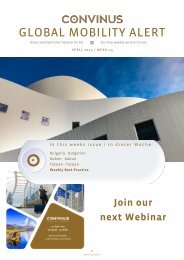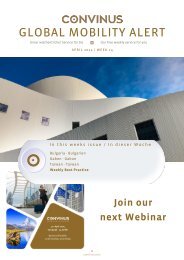CONVINUS Global Mobility Alert - Week 30.2023
Create successful ePaper yourself
Turn your PDF publications into a flip-book with our unique Google optimized e-Paper software.
GLOBAL MOBILITY ALERT<br />
Unser wöchentlicher Service für Sie Our free weekly service for you<br />
J U L Y 2 0 2 3 | W E E K 3 0<br />
I n t h i s w e e k s i s s u e / I n d i e s e r W o c h e<br />
Switzerland - Schweiz<br />
United Kingdom - Vereinigtes Königreich<br />
Germany - Deutschland<br />
<strong>Week</strong>ly Best Practice<br />
<strong>CONVINUS</strong> Webinar mit<br />
Zertifikat für Ihren<br />
Karriere-Booster im<br />
Bereich <strong>Global</strong> <strong>Mobility</strong>
S h o r t N e w s J u l y 2 7 , 2 0 2 3<br />
Switzerland - Italy<br />
New taxation rules for cross-border commuters as of 1 January 2024<br />
The agreement on the taxation of cross-border commuters and the corresponding protocol of amendment between<br />
Switzerland and Italy entered into force on 17 July 2023 and will be applicable from 1 January 2024. The agreement provides<br />
that cross-border commuters must pay tax on their income in their country of residence. However, the country of<br />
employment may levy 80% of the withholding tax on the earned income. Double taxation is avoided in the State of<br />
residence as follows:<br />
in Italy with crediting of the Swiss withholding tax<br />
in Switzerland with the exemption of the income and only taken into account for the determination of the tax rate.<br />
In Switzerland, the withholding tax rate for cross-border commuters from Italy will be reduced to 80% from 1 January 2024<br />
and new tariff codes will be introduced for this purpose. According to the agreement, cross-border commuters are all<br />
employees who live up to a maximum of 20 kilometers from the border and generally commute daily. This definition of a<br />
cross-border commuter applies from the entry into force of the new agreement. For cross-border commuters who work or<br />
have worked in the cantons of Graubünden, Ticino, or Valais between 31 December 2018 and the entry into force of the new<br />
agreement (17 July 2023), a transitional period applies until the end of the 2033 tax year. Their employment income will<br />
continue to be taxed exclusively in Switzerland.<br />
United Kingdom<br />
Changes as of 17 July 2023 for international students<br />
From 17 July 2023, if international students in the UK wish to change their visa to take up employment in the UK, they will<br />
only be able to do so after they have completed their studies. International postgraduate students in the UK can apply for<br />
the change while they are still studying, as long as the start date of their employment is after the end of their studies. This<br />
must be taken into account in graduate programs of companies in the UK.<br />
Germany<br />
EasyPass<br />
As of 3 July 2023, the use of EasyPass has been extended. This can be used by persons with one of the following valid<br />
electronic passports:<br />
nationals from an EU and EFTA member state and Switzerland and at least 12 years old,<br />
nationals from USA / Hong Kong / Korea / Taiwan with an EasyPass RTP registration and at least 18 years old<br />
all nationals with a valid German residence permit and at least 12 years of age.<br />
This means that when entering or leaving Germany, you no longer have to queue for a long time at the passport controls<br />
but can do this independently with the help of the EasyPass system. So far, these automated systems are only available at<br />
the following airports in Germany: Frankfurt am Main, Munich, Cologne/Bonn, Düsseldorf, Berlin, Brandenburg, Stuttgart,<br />
Hanover, and Hamburg.<br />
2<br />
convinus.com
K u r z n a c h r i c h t e n 2 7 . J u l i 2 0 2 3<br />
Schweiz - Italien<br />
Neue Besteuerungsregeln für Grenzgänger ab dem 1. Januar 2024<br />
Das Abkommen bezüglich der Besteuerung von Grenzgängern sowie das entsprechende Änderungsprotokoll zwischen der<br />
Schweiz und Italien ist per 17. Juli 2023 in Kraft getreten und sind ab dem 1. Januar 2024 anwendbar. Das Abkommen sieht<br />
vor, dass Grenzgänger im Wohnsitzstaat ihr Einkommen versteuern müssen. Der Erwerbsortstaat darf allerdings 80 % der<br />
Quellensteuer auf dem Erwerbseinkommen erheben. Die Doppelbesteuerung wird im Wohnsitzstaat wie folgt vermieden:<br />
in Italien mit Anrechnung der Schweizer Quellensteuer<br />
in der Schweiz mit Freistellung des Einkommens bei Berücksichtigung dieses für die Ermittlung des Steuersatzes<br />
In der Schweiz wird der Quellensteuersatz für Grenzgänger aus Italien ab dem 1. Januar 2024 auf 80 % gekürzt und es<br />
werden dafür neue Tarifcodes eingeführt. Als Grenzgänger gilt gemäss dem Abkommen alle Arbeitnehmende, welche bis<br />
max. 20 Kilometer von der Grenze entfernt wohnen und grundsätzlich täglich pendeln. Diese Definition des Grenzgängers<br />
gilt ab dem Inkrafttreten des neuen Abkommens. Für Grenzgänger, die zwischen dem 31. Dezember 2018 und dem<br />
Inkrafttreten des neuen Abkommens (17. Juli 2023) in den Kantonen Graubünden, Tessin oder Wallis arbeiten oder<br />
gearbeitet haben gilt bis zum Ende des Steuerjahres 2033 eine Übergangsfrist. Ihr Erwerbseinkommen unterliegt weiterhin<br />
ausschliesslich der Besteuerung in der Schweiz.<br />
Vereinigtes Königreich<br />
Änderungen per 17. Juli 2023 für internationale Studenten<br />
Wenn internationale Studenten in Grossbritannien ihr Visum für die Aufnahme einer Erwerbstätigkeit in Grossbritannien<br />
ändern möchten, können sie dies seit dem 17. Juli 2023 erst nach Beendigung ihres Studiums. Internationale Doktoranden<br />
in Grossbritannien können den Wechsel schon während des Studiums beantragen, sofern der Arbeitsbeginn nach dem<br />
Ende des Studiums liegt. Dies muss in Bezug auf Graduate-Programmen von Unternehmen in Grossbritannien<br />
mitberücksichtigt werden.<br />
Deutschland<br />
EasyPass<br />
Per 3. Juli 2023 wurde die Nutzung von EasyPass erweitert. Dies können Personen mit einem der folgenden gültigen<br />
elektronischen Reisepässe nutzen:<br />
Staatsangehörige aus einem EU- und EFTA Mitgliedsstaat sowie der Schweiz und mindestens 12 Jahre alt,<br />
Staatsangehörige aus USA / Hongkong / Korea / Taiwan mit einer EasyPass-RTP Registrierung und mindestens 18 Jahre<br />
alle Staatsangehörige mit gültigem deutschen Aufenthaltstitel und mindestens 12 Jahre alt<br />
Dies bedeutet bei der Ein- und Ausreise aus Deutschland muss man nicht mehr lange bei den Passkontrollen anstehen,<br />
sondern kann mithilfe der EasyPass-Anlagen dies selbständig erledigen. Bis jetzt gibt es in Deutschland diese automatisierten<br />
Anlagen nur an den Flughäfen: Frankfurt am Main, München, Köln/Bonn, Düsseldorf, Berlin, Brandenburg,<br />
Stuttgart, Hannover und Hamburg.<br />
3<br />
convinus.com
ON<br />
DIVE IN<br />
GLOBAL<br />
MOBILITY<br />
tiktok.com/@convinus_gms/
Best Practice<br />
Employment abroad and residence in Switzerland - how does it work?<br />
In our previous episodes, we looked at the situation of people who live abroad and are employed in Switzerland. In this<br />
episode, we will now look at the opposite situation.<br />
Some foreign and Swiss nationals live in Switzerland but work for a foreign employer. In some cases, these foreign employers<br />
do not have a company or branch in Switzerland.<br />
When looking at the individual aspects, one can see that there are also some challenges to overcome in Switzerland.<br />
Case study:<br />
Drinks LLC in the USA has found a software developer in Switzerland whom they would like to hire. Indra Kumar is an Indian<br />
national and could start working immediately. She moved to Switzerland two years ago to join her husband.<br />
In principle, Drinks LLC would also have a legal entity in Switzerland, but this position would only be for the American<br />
company. Therefore, she shall not be employed by the Swiss company.<br />
Question<br />
Is it possible to employ Mrs. Kumar in the USA, but her place of work is in Switzerland?<br />
Possible solutions<br />
In principle, it is possible to employ Mrs. Kumar in the USA, even if she performs her work exclusively in Switzerland.<br />
However, there are a few aspects that need to be considered.<br />
Employment contract<br />
No standard American employment contract can be issued for Mrs. Kumar, but it must be adapted to Swiss employment law.<br />
Since she will be working in Switzerland, Swiss labour law applies to her.<br />
Permit<br />
Mrs. Kumar has a B permit. The B permit states the following purpose: Family reunification with gainful employment. Based<br />
on this permit, she may also work for a foreign employer. Nothing has to be done from an immigration point of view.<br />
If Mrs. Kumar would also have to work at Drinks LLC in the USA for a few days, it must be checked what kind of work permit<br />
she needs for this in the USA.<br />
Social security<br />
Because she works in Switzerland, Mrs. Kumar is subject to social insurance in Switzerland. As Drinks LLC is based in the USA,<br />
Mrs. Kumar must be registered as an "ANoBAG" (employee without a contributory employer). She then pays contributions to<br />
the AHV/IV/EO, unemployment and accident insurance, and pension fund. Drinks LLC then pays the employer's share.<br />
5<br />
convinus.com
Best Practice<br />
Since in Switzerland the conclusion of a daily sickness benefit insurance is not mandatory, Drinks LLC may consider this. If no<br />
daily sickness benefits insurance is taken out, it would be necessary to agree on the obligation to continue to pay wages in<br />
the event of illness by one of the tables.<br />
Since Drinks LLC is based in the USA, it is difficult to find a pension fund in Switzerland that will accept Drinks LLC and the<br />
employee. As a rule, the only remaining option is the catch-all institution.<br />
Taxes<br />
As Drinks LLC is based in the USA, Drinks LLC is not obliged to deduct the withholding tax of Mrs. Kumar's canton of<br />
residence. Mrs. Kumar must declare her earned income independently in her tax return in Switzerland and then pay tax on it<br />
accordingly.<br />
Even if the spouses have not had to file a tax return so far, as neither of them has earned more than CHF 120,000 each, the<br />
filing of the tax return is necessary when they start working for Drinks LLC.<br />
However, if Mrs. Kumar has to go to Drinks LLC in the USA for a few working days a year, then the appropriate earned income<br />
for these days would be taxable in the USA.<br />
Permanent establishment<br />
As a general rule, in these situations, one should always at least make a brief analysis of the risk of establishing a permanent<br />
establishment through an employee's work abroad. Mrs. Kumar’s activity as a software developer does not give rise to a<br />
permanent establishment risk in Switzerland.<br />
Payroll<br />
It is possible that Drinks LLC does not commission anyone with the management of payroll accounting in Switzerland but<br />
leaves the payment of insurance contributions and administration to the employee.<br />
Because most of the forms / information are only available in the cantonal language, as well as the fact that the subject<br />
matter is not very simple and that there is a high risk in the event of an incorrect declaration, it is advisable to commission a<br />
specialized company (fiduciary / tax consultant) in Switzerland with this task.<br />
CONCLUSION<br />
The employment of Mrs. Kumar at Drinks LLC is possible but requires a great deal of effort on the part of Drinks LLC. From an<br />
administrative point of view, employment via the Swiss company is the simpler way.<br />
6<br />
convinus.com
Best Practice<br />
Anstellung im Ausland und Wohnsitz in der Schweiz – wie geht das?<br />
In unseren vorherigen Folgen haben wir die Situation von Personen mit Wohnsitz im Ausland und Anstellung in der Schweiz<br />
betrachtet. In dieser Folge gehen wir nun auf die umgekehrte Situation ein.<br />
Einige ausländische sowie Schweizer wohnen in der Schweiz, aber arbeiten für einen ausländischen Arbeitgeber. Teilweise<br />
haben diese ausländischen Arbeitgeber keine Gesellschaft oder Niederlassung in der Schweiz.<br />
Bei der Betrachtung der einzelnen Aspekte sieht man, dass es auch in der Schweiz einige Herausforderungen zu meistern gilt.<br />
Fallbeispiel:<br />
Die Drinks LLC in den USA hat einen Softwareentwickler in der Schweiz gefunden, welchen sie anstellen möchten. Indra<br />
Kumar ist indische Staatsangehörige und könnte sofort anfangen zu arbeiten. Sie ist vor zwei Jahren zu ihrem Mann in die<br />
Schweiz gezogen.<br />
Die Drinks LLC hätte grundsätzlich auch noch eine Gesellschaft in der Schweiz, allerdings wäre die Tätigkeit dieser Position<br />
nur für die amerikanische Gesellschaft. Daher möchte man die Anstellung nicht über die Schweizer Gesellschaft laufen<br />
lassen.<br />
Frage<br />
Besteht die Möglichkeit, Frau Kumar in den USA anzustellen, wobei ihr Arbeitsort in der Schweiz ist?<br />
Lösungsmöglichkeiten<br />
Grundsätzlich besteht die Möglichkeit, Frau Kumar in den USA anzustellen, auch wenn sie ihre Tätigkeit ausschliesslich in<br />
der Schweiz erbringt. Es gibt hierbei allerdings ein paar Aspekte, die man dabei beachten muss.<br />
Arbeitsvertrag<br />
Es kann für Frau Kumar kein amerikanischer Standard-Arbeitsvertrag ausgestellt werden, sondern dieser muss auf das<br />
Schweizer Arbeitsrecht angepasst werden. Da sie ihre Tätigkeit in der Schweiz ausüben wird, ist für sie das Schweizer<br />
Arbeitsrecht massgebend.<br />
Bewilligung<br />
Frau Kumar besitzt eine B-Bewilligung. Auf der B-Bewilligung ist der folgende Zweck angegeben: Familiennachzug mit<br />
Erwerbstätigkeit. Basierend auf dieser Bewilligung darf sie auch für einen ausländischen Arbeitgeber arbeiten. Es muss aus<br />
bewilligungsrechtlicher Sicht nichts unternommen werden.<br />
Für den Fall, dass Frau Kumar auch bei der Drinks LLC in den USA einige Tage arbeiten müsste, muss geprüft werden, welche<br />
Art von Arbeitsbewilligung sie hierfür in den USA benötigt.<br />
Sozialversicherung<br />
Aufgrund der Ausübung der Tätigkeit in der Schweiz ist Frau Kumar in der Schweiz sozialversicherungspflichtig.<br />
7<br />
convinus.com
Best Practice<br />
Da die Drinks LLC in den USA ihren Sitz hat, muss Frau Kumar als «ANoBAG» (Arbeitnehmer ohne beitragspflichtigen<br />
Arbeitgeber) angemeldet werden. Sie bezahlt dann Beiträge an die AHV/IV/EO, Arbeitslosen- und Unfallversicherung sowie<br />
Pensionskasse. Die Drinks LLC bezahlt dann den Arbeitgeberanteil.<br />
Da in der Schweiz der Abschluss einer Krankentaggeldversicherung nicht zwingend ist, kann die Drinks LLC sich dies<br />
überlegen. Sollte keine Krankentaggeldversicherung abgeschlossen werden, müsste man sich auf die Lohnfortzahlungspflicht<br />
im Krankheitsfalle gemäss einer der Tabellen einigen.<br />
Aufgrund dessen, dass die Drinks LLC ihren Sitz in den USA hat, ist es in der Schweiz schwierig eine Pensionskasse zu finden,<br />
welche die Drinks LLC und die Mitarbeiterin aufnehmen wird. In der Regel bleibt als einzige Möglichkeit die Auffangeinrichtung.<br />
Steuern<br />
Da die Drinks LLC ihren Sitz in den USA hat, ist die Drinks LLC nicht verpflichtet, die Quellensteuer des Wohnsitzkantons von<br />
Frau Kumar in Abzug zu bringen. Frau Kumar muss ihr Erwerbseinkommen selbständig in der Steuererklärung in der Schweiz<br />
deklarieren und darauf dann entsprechend Steuern bezahlen.<br />
Auch wenn die Eheleute bisher keine Steuererklärung einreichen mussten, da bisher keiner der beiden jeweils über CHF<br />
120'000 verdient hatten, ist die Einreichung der Steuererklärung mit Aufnahme der Tätigkeit bei der Drinks LLC notwendig.<br />
Sofern Frau Kumar jedoch für einige Arbeitstage im Jahr zur Drinks LLC in die USA gehen muss, dann wäre das entfallende<br />
Erwerbseinkommen für diese Tage in den USA steuerpflichtig.<br />
Betriebsstätte<br />
Grundsätzlich sollte man in diesen Situationen immer zumindest eine Kurzanalyse betreffend des Risikos einer Begründung<br />
einer Betriebsstätte durch die Tätigkeit eines Mitarbeiters im Ausland vornehmen. Frau Kumars’ Tätigkeit als Softwareentwicklerin<br />
begründet in der Schweiz kein Risiko der Betriebsstätte.<br />
Payroll<br />
Es besteht die Möglichkeit, dass die Drinks LLC niemanden mit der Führung einer Lohnbuchhaltung in der Schweiz<br />
beauftragt, sondern die Bezahlung der Versicherungsbeiträge und Administration der Mitarbeiterin überlässt. Schon auf<br />
Grund dessen, dass die meisten Formulare / Informationen nur in der Kantonssprache vorhanden sind, sowie die Thematik<br />
nicht ganz einfach und ein hohes Risiko bei falscher Deklaration vorhanden ist, ist es empfehlenswert ein spezialisiertes<br />
Unternehmen (Treuhänder / Steuerberater) in der Schweiz damit zu beauftragen.<br />
FAZIT<br />
Die Anstellung von Frau Kumar bei der Drinks LLC ist möglich, bedingt allerdings einen grossen Aufwand für die Drinks LLC.<br />
Die Anstellung über die Schweizer Gesellschaft ist aus administrativer Sicht gesehen, der einfachere Weg.<br />
8<br />
convinus.com
Legal disclaimer<br />
<br />
The content of this presentation is for general guidance only and should by no means be used<br />
as a substitute for an individual consultation with professional accounting, tax, legal or other<br />
competent advisers. While we have made every attempt to ensure that the information<br />
delivered with this presentation has been obtained from reliable sources, <strong>CONVINUS</strong> is not<br />
responsible for any errors or omissions, or for the results obtained from the use of this<br />
information. The entire content of this webinar is the intellectual property of <strong>CONVINUS</strong> and is<br />
under copyright. Any modification, duplication, distribution and public disclosure of the<br />
content or parts there of requires the written consent of <strong>CONVINUS</strong>.<br />
Our Offices<br />
Zurich<br />
<br />
<br />
<br />
<br />
Talstrasse 70<br />
CH-8001 Zurich<br />
<br />
Tel. +41 44 250 20 20<br />
Fax +41 44 250 20 22<br />
<br />
info.zuerich@<br />
convinus.com<br />
Basel<br />
<br />
<br />
<br />
<br />
Aeschengraben 29<br />
CH-4051 Basel<br />
<br />
Tel. +41 61 508 20 40<br />
Fax +41 61 508 20 44<br />
<br />
info.basel@<br />
convinus.com<br />
Geneva<br />
<br />
<br />
<br />
<br />
Postfach<br />
CH-1215 Geneva<br />
<br />
Tel. +41 22 508 20 60<br />
Fax +41 22 508 20 66<br />
<br />
info.genf@<br />
convinus.com<br />
Zug<br />
<br />
<br />
<br />
<br />
Turmstrasse 18<br />
CH-6300 Zug<br />
<br />
Tel. +41 41 508 20 70<br />
Fax +41 41 508 20 77<br />
<br />
info.zug@<br />
convinus.com<br />
NOTE:<br />
The contents of this newsletter represent only general information and are in no way a substitute for individual advice. The contents have been<br />
selected with great care, but <strong>CONVINUS</strong> accepts no liability for any damage whatsoever resulting from the use of the information provided here. The<br />
entire content of the newsletter is the intellectual property of <strong>CONVINUS</strong> and is subject to copyright. Any modification, copying, distribution and<br />
public reproduction of the content or parts thereof requires the prior written consent of <strong>CONVINUS</strong>.<br />
IMPRINT:<br />
Publisher: <strong>CONVINUS</strong> GmbH ∙ Talstrasse 70 ∙ CH-8001 Zurich<br />
Tel. +41 44 250 20 20 ∙ Fax +41 44 250 20 22<br />
info@convinus.com ∙ convinus.com ∙ © <strong>CONVINUS</strong> GmbH<br />
You can also visit us on LinkedIn , Youtube & TikTok<br />
9<br />
convinus.com


